Go back to a time when a 56k modem made you a god among geeks with Neuromancer
We're rerunning Richard Cobbett's classic Crapshoot column, in which he rolled the dice and took a chance on obscure games—both good and bad.
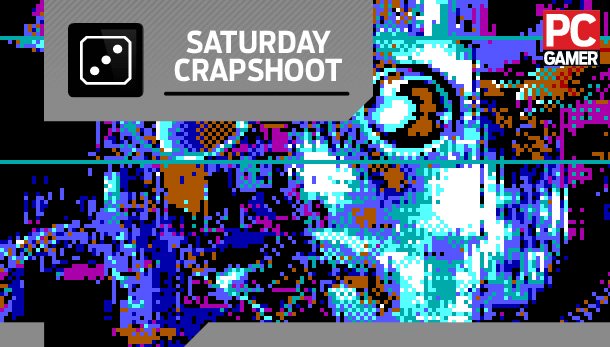
Every week, Richard Cobbett rolls the dice to bring you an obscure slice of gaming history, from lost gems to weapons grade atrocities. This week, William Gibson's pioneering cyberpunk novel, now in adventure/RPG hybrid form. And wow, is it a weird little historical artefact.
The future's always been a tough thing to predict, but does generally go one of three basic routes—dystopia, utopia, everything turned into sentient cheese by deep space super-bacteria. Oh, that tiresome old cliché. When it comes to anything with the word "cyber" in it, you pretty much know what you're going to get. It's going to be dark. It's going to be cynical. Chances are it's going to be heavily "inspired" by Blade Runner. Surprisingly few people will have worked out that carrying umbrellas around 24/7 is a really, really smart idea. And it's almost certainly going to owe a serious debt to William Gibson's Neuromancer, which was published in 1984 and is one of those books so influential that is almost doesn't need to be read any more to know more or less what goes down and the kind of elements it plays with.
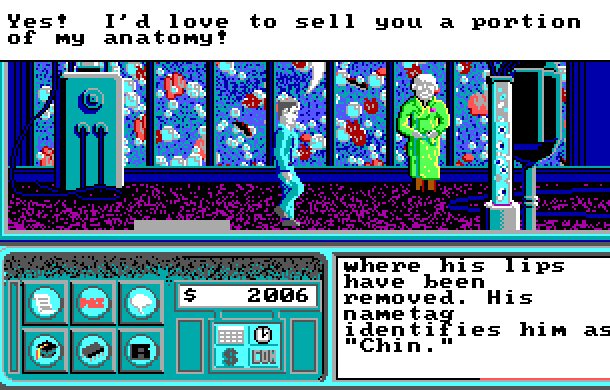
1988 was clearly too early for something so forward looking to be made into a game. But Interplay decided to give it a crack anyway. And it is... ah... well, you'll see. Let's start with the obvious. This is a game where one of the first things you can do is walk into an organ store and sell your body parts for cash. Enthusiastically. Heart, 6000 credits. Lungs, 3000. No discount for bulk. Tongue, 150, Spleen, 45, Appendix, just 3, and probably better not to ask exactly why someone might buy it. I suspect a kebab is in that particular flesh-blob's near future. And you're not restricted to just selling one or two. Nope, you can have everything harvested from spleen to bone marrow for some quick cash, and quick cash that you as cyberpunk's most pathetic would be hacker really needs—a hacker who starts the game waking up in a bowl of spaghetti he can't really afford. His luck, needless to say, pretty much only goes downhill from there.
Neuromancer the game uses the same locations as Neuromancer the book, Chiba City, but has a different plot and main character—a little like Westwood's Blade Runner game would ultimately do, only without the glitz or just trying to stealth-remake the original. (There was actually another Blade Runner game at around the same time, based on—cough—the soundtrack. It just so happened... gosh... that the creators' vision of a world built on Vangelis' music happened to involve a detective in a trenchcoat shooting human robots, "replodroids", in a city built around a fusion of Japanese culture and Los Angeles grime.)
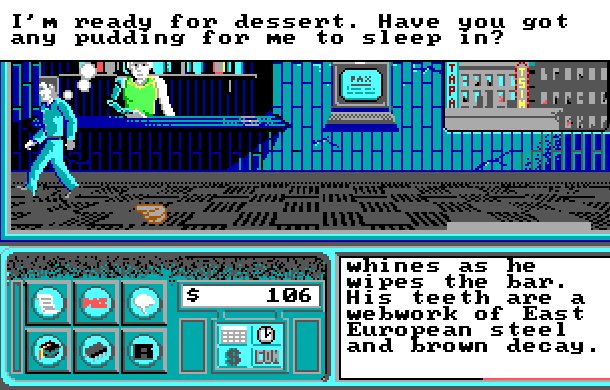
The story though isn't really the point. It's there, it exists, and it's about as complex and well-integrated as you'd expect for a 1988 adventure game from a company that was more used to making RPGs like Wasteland and Escape From Hell. You spend the first half stumbling around and trying to get equipped with everything you need to be a proper cyberpunk hacker, then the second in cyberspace fighting an assortment of AIs to protect the electric interwebs from Neuromancer himself.
Bulletin boards add more details, but really the second half is a major slog and it's not worth caring too much about the why and how of what you're doing. Instead, what makes Neuromancer cool is the where, with Chiba City a wonderfully, wilfully surreal place to hang out for a while. Not long. But a bit.
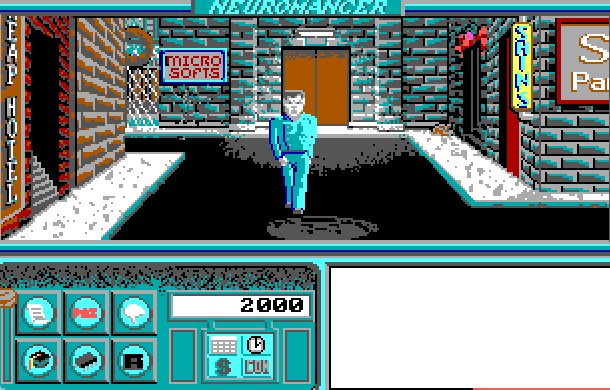
Where to begin, where to begin? While a few locations are taken from Neuromancer the book, mostly this was Interplay just going a little bit insane and putting the insanity on screen. Our hero, who has no official name so I'm going to call him Hacker P. Hackington, lives in a cheap hotel literally called Cheap Hotel (from the book, whose protagonist aspired to staying in somewhere that classy).
Keep up to date with the most important stories and the best deals, as picked by the PC Gamer team.
Borrowing liberally from the style of the book—and lifting a few descriptions directly—it's described as smelling "of cigarettes and cheap perfume. The roof is made of thin laminated matting that rattles in the wind. White fiberglass coffins serve as the rooms, stacked like surplus Godzilla teeth." It's so classy, you can order caviar by room service. Well, in theory. In practice, "The management kicks you out for not paying your bill."
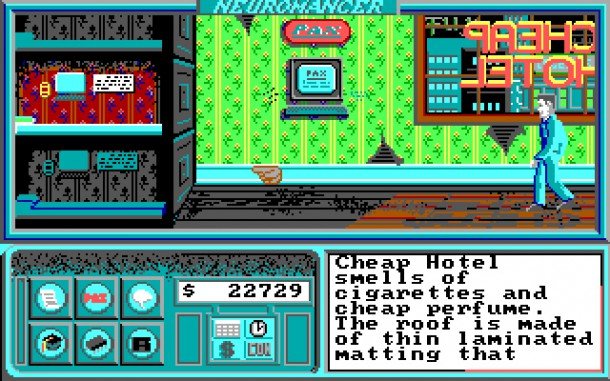
Again, remembering that this game came out in 1988, there's a wonderful amount of detail provided in the little descriptions, which Interplay also made good use out of in its other games to breathe life into their 2D maps. The opening spiel says it all, along with making great use of easily Neuromancer's best and most remembered metaphor: "You've just spent the night sleeping face-down in a plate of synth-spaghetti in a bar called the Chatsubo. After rubbing the sauce out of your eyes, you can see Chiba sky through the window, the colour of television turned to a dead channel. Ratz' prosthetic Russian arm whines as he wipes the bar. His teeth are a webwork of East European steel and brown decay."
Lovely. But that's just the start of it. While there's nothing to click and prod at like in most games, interactions primarily happening through conversation and online bulletin boards, logging onto one of those boards immediately pops up the story "BAR FOOD DECLARED FATAL". And Hacker P. Hackington being the unluckiest son of a bitch ever to accidentally mistake Doritos for computer chips and stick one up his nose, is immediately greeted with "The Chatsubo bar will be permanently closed today, according to the Chiba Health Department. Contaminated food and toxic beer are the main reasons for the closure, though there have been other health violations. so far, 87 fatalities have been reported."
Well, it could be worse. And it is! "Most of the fatalities occurred with Chatsubo patrons who drank more than 3 glasses of beer and ate the synth-spaghetti, which is based on a home recipe. The spaghetti and beer combined in the bodies of the victims to create an explosive chemical ignited by stomach acids."
Thank goodness for the lighter side of the news.
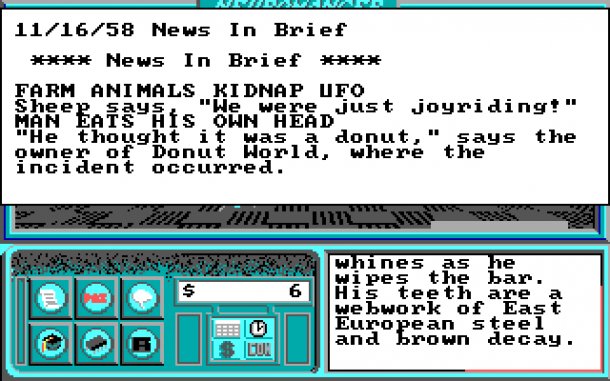
It's such a weird little world. Even the computer terminals join in, gleefully announcing that they're based on the Gibson Mandate of 2036, allowing access to the Central Database Interlink (CDI), then descending to a wink by adding on Friendly Interface System Hardware (FISH), and finally dropping the wink to instead make the universal "wanker" gesture by declaring all this to be in concordance with the World Holographic Organizational Obligation For Electronic Eavesdropping guidelines, WHOOPEE for short, and then descending into an acronym-filled explanation of how impenetrable acronyms make everyone's lives so much less complicated. Douglas Adams would be proud.
But then, you head outside. And discover that the closest thing to a religious institution in these dark streets is... really... the House of Pong. "A quiet and restful place occupied by Pong Monks who spend their days meditating on the mysteries of the One True Computer Game." Here, "Apprentice Monks must contemplate the mysteries of the One True Game for 20 years before they are allowed to play," which means Hacker P. Hackington is unlikely to ever join their esteemed number. After all:
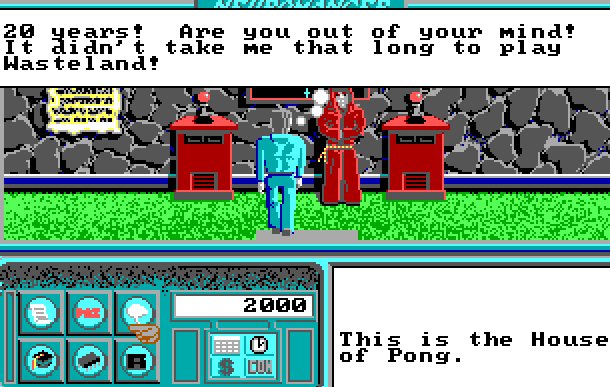
The dialogue is pretty limited, but makes the most of it for the same amount of oddness. It's possible to get discounts on gear from the local computer shop for instance by manipulating the owner, Asano, into an insult-slinging match over his rival, "Crazy Edo". From incredible politeness to "EDO IS THE SON OF A TURTLE! MAY THE GODS POKE HIM WITH STICKS WHEN HE DIES!" in one manipulative conversation.
Or there's Hacker P. Hackington himself, who gets to play as either a slightly canny operator or just a wandering crazy person, whether dealing with hookers, data-brokers, or oddly territorial cops.
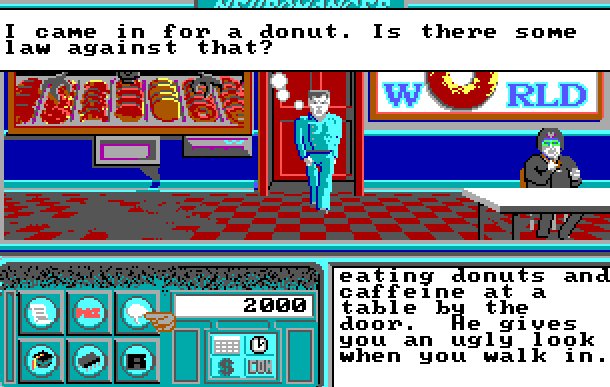
Tangling with the law is usually a bad idea though, because it means the kind of kangaroo court that would make Phoenix Wright crossed with Darkseed 2's Hall of Death seem like a shining beacon of criminal procedure. All arrests take place in a Justice Booth, where a Compu-Judge holds Compu-Court. All crimes are classified as "serious", from meeting up with a fugitive to speaking to a data broker to failing to pay a bar tab, but it's OK! Provided you have the credits, you can afford a Compu-Lawyer! And as it points out, "You need me." The judge even agrees. "You're in big trouble, citizen."
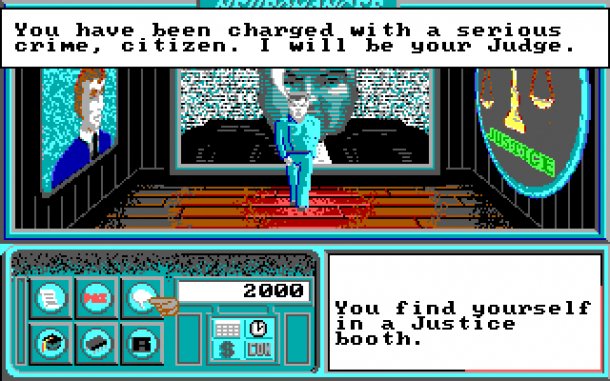
But it's your choice! Without a lawyer, the defence part of things goes something like this:
"I'm innocent!"
"The court notes your plea."
And then you're found guilty.
With a lawyer, of course, things are different.
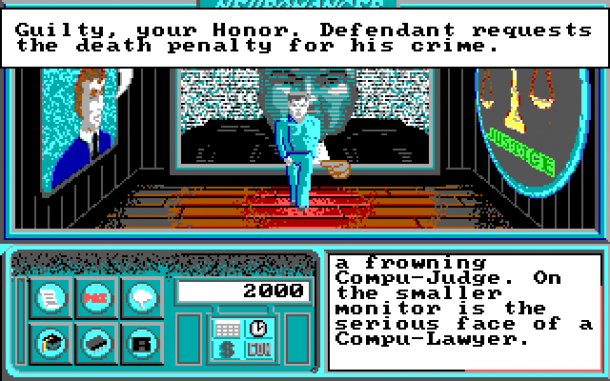
In most cases, the punishment is just a fine of a few hundred credits - to which your lawyer gleefully responds "Haha! Guilty!" It's possible to be given the death penalty after multiple visits though, and that's inevitably a little bit of a problem. "In view of your criminal history, I can't be as easy on you as I have been in the past," intones the judge. "This being the case, I hereby sentence you to death with the feeble hope that you will learn something from this experience."
Of course, this being a cyberpunk world, death isn't the end of the world. But don't think that means the universe is cutting our friend Hacker P. Hackington any slack, because while he does wake up in the local spare body parts shop, it's to be told "I kickstarted your dead brain. My fee just happens to equal the amount of credits you were carrying." And if you've already sold all your body parts, well, then you are what is colloquially referred to as "screwed". Cyber-screwed. In the future.
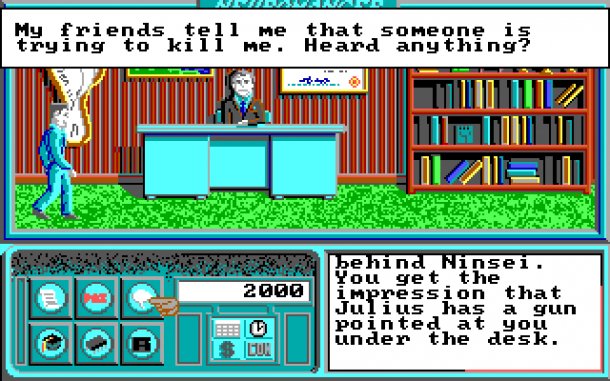
The basic problem with Neuromancer as a game is that it's never clear exactly what you're meant to do, and as fun as the locations are, there aren't that many of them. When you hit cyberspace, things get much less interesting and amusing very quickly. It becomes about fighting assorted floating heads with skills like Philosophy and Sophistry, and picking up plot stuff that's really not that interesting—setting a trend that would be continued in literally every single game to add cyberspace. Even the best cyberpunk games—System Shock, Beneath a Steel Sky, Sam and Max Hit the Road and so on—dropped that ball hard enough to bounce it into space, and lesser games like Hell and Ripper just had no chance whatsoever.
Cyberspace is anathema to games. It is fun's kryptonite. It is a bad idea on a par with putting nitroglycerin on toast.
Quirky as it is, there are reasons why this isn't a well remembered game. That said, had the sequel been made, I suspect it would have been—not so much for what it was trying to do, but because it was being pushed by legendary taker of drugs Timothy "The Great Experimenter" Leary. (It's said that this game was too, though there's no mention of it anywhere inside). The plans were for a "mind movie" that sounds a lot like an interactive movie. There's a little information about it here, and a little more about a project that did come out—a personality experimentation system called Mind Mirror that's still floating around.
As for cyberspace? Well, it didn't turn out anything like cyberpunk predicted.
But then, given what Second Life did to the idea of the Metaverse, that's probably for the best.
CONNECTION LOST

